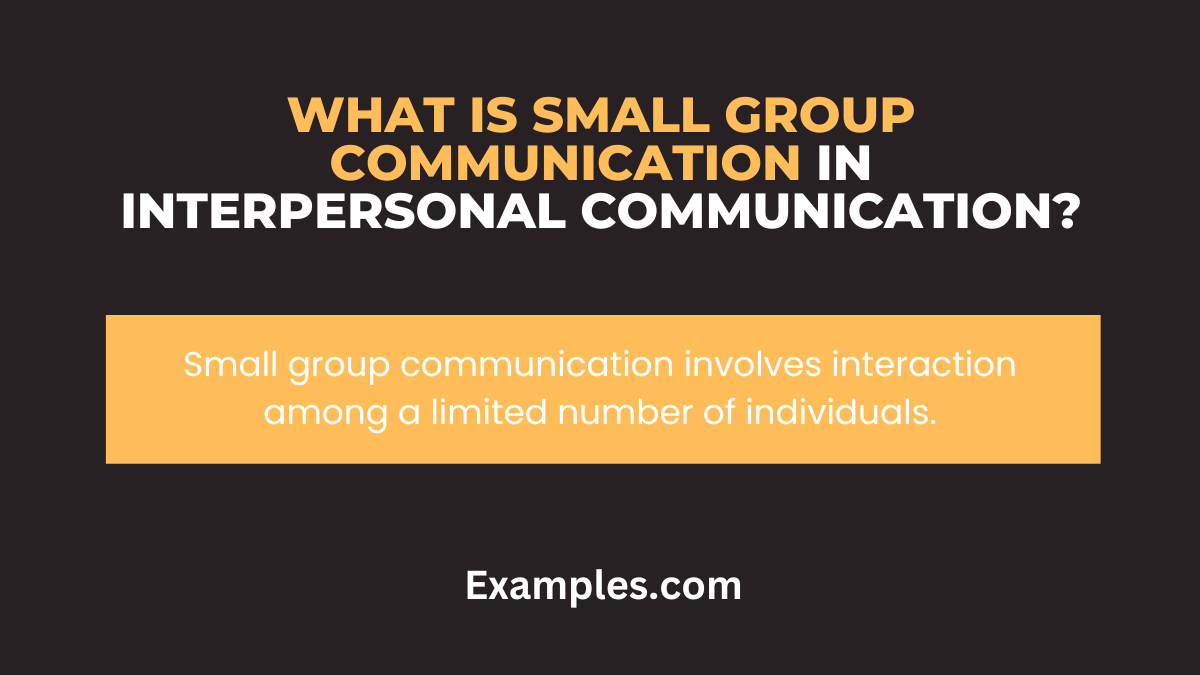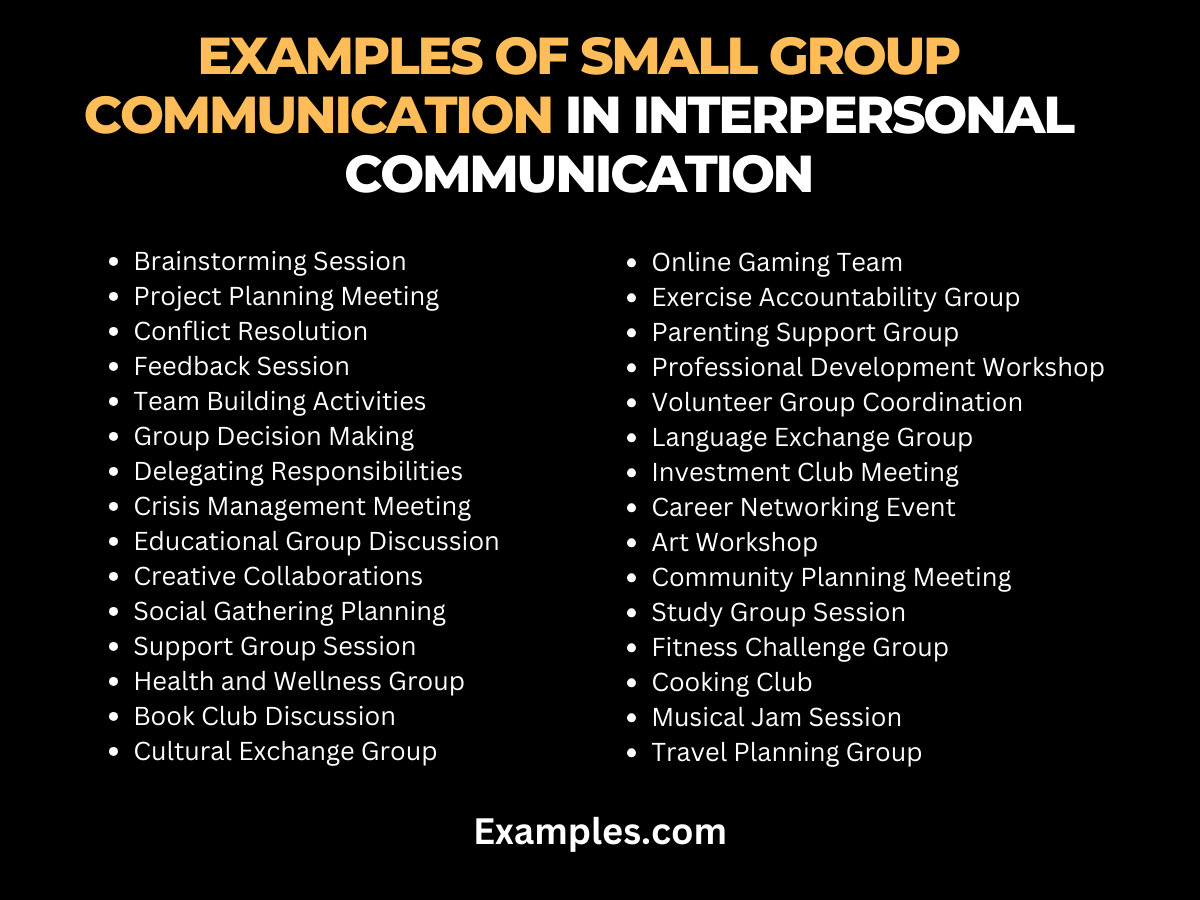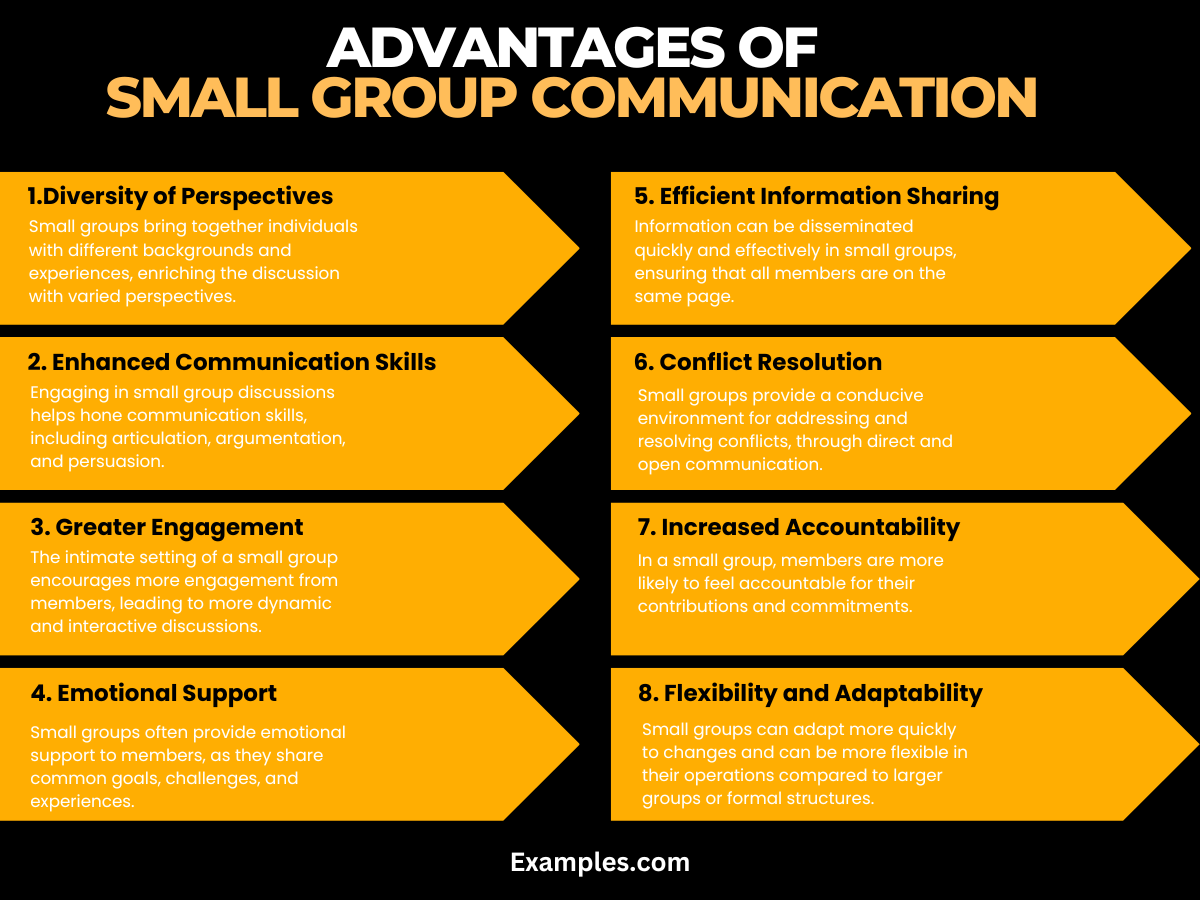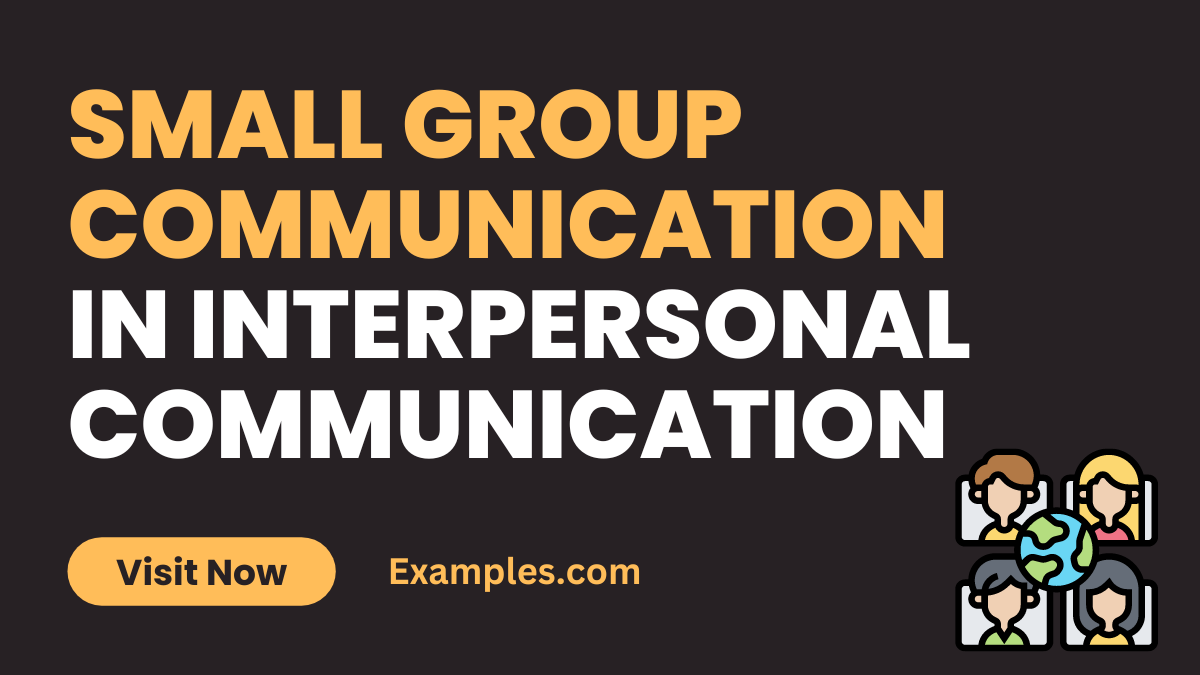19+ Small Group Communication in Interpersonal Communication Examples
Understanding Small Group Communication in Interpersonal Communication is crucial for effective collaboration in both personal and professional spheres. This comprehensive guide delves into the dynamics of small group interactions, emphasizing the role of interpersonal skills in facilitating effective communication within groups. By examining various aspects like verbal and non-verbal cues, active listening, and emotional intelligence, readers will gain insights into how small group communication functions and how it can be optimized for better teamwork and understanding. Real-world examples are provided to illustrate these concepts in action, making the guide practical and relatable for anyone looking to enhance their group communication skills.
What is Small Group Communication in Interpersonal Communication?

Small Group Communication in Interpersonal Communication refers to the process through which a small number of individuals, typically between three to twelve, interact and exchange information, ideas, and feelings. This form of communication is characterized by more intimate and direct interactions, where each member has the opportunity to contribute actively. It’s a vital component of interpersonal dynamics, playing a crucial role in various settings such as family gatherings, business meetings, academic projects, and social circles. The essence of small group communication lies in its ability to foster deeper understanding, collaborative problem-solving, and stronger relational bonds among its participants.
What is the Best Example of Small Group Communication in Interpersonal Communication?
One of the best examples of Small Group Communication in Interpersonal Communication is a project team meeting in a workplace setting. In this scenario, a diverse group of professionals comes together to discuss, brainstorm, and strategize on a specific project. Each team member brings unique skills, perspectives, and ideas to the table, contributing to a collective goal. This setting exemplifies key aspects of small group communication, such as the importance of active listening, the value of diverse opinions, and the need for clear and respectful dialogue. The interaction not only revolves around sharing information but also involves negotiating, problem-solving, and decision-making, making it a rich context for studying and understanding the dynamics of small group interpersonal communication.
20 Examples of Small Group Communication in Interpersonal Communication

Small group communication in interpersonal communication plays a vital role in various settings, providing a platform for collaborative decision-making, problem-solving, and relationship building. It typically involves a small number of people, allowing for more in-depth discussion and interaction. Effective small group communication hinges on good interpersonal communication skills, such as active listening, clear verbal communication, and positive non-verbal cues. It’s crucial in both personal and professional contexts, fostering teamwork, understanding, and mutual support. Proficiency in small group communication enhances overall interpersonal communication capabilities, making it a key area for development.
- Brainstorming Session: In a group meeting, suggest ideas openly and encourage others to build upon them.
Example: “I think we should explore digital marketing strategies. What are your thoughts on this?” - Project Planning Meeting: Discuss project goals and delegate tasks.
Example: “Let’s define our project milestones. John, can you take the lead on the research phase?” - Conflict Resolution: Address group conflicts by encouraging open dialogue.
Example: “I sense some disagreement. Let’s discuss this openly to find a solution.” - Feedback Session: Share constructive feedback in a respectful manner.
Example: “Your presentation was very informative. Maybe next time, more visuals could be added for impact.” - Team Building Activities: Engage in activities that strengthen group cohesion.
Example: “Let’s do a team-building exercise to enhance our collaboration skills.” - Group Decision Making: Facilitate a democratic process for making decisions.
Example: “Let’s take a vote to decide on our next team outing location.” - Delegating Responsibilities: Assign tasks based on individual strengths.
Example: “Emma, your design skills would be perfect for this part of the project.” - Crisis Management Meeting: Discuss strategies to handle a crisis effectively.
Example: “We need to address this issue urgently. Let’s brainstorm potential solutions.” - Educational Group Discussion: Share knowledge and insights on a specific topic.
Example: “In today’s discussion, let’s focus on the latest trends in our field.” - Creative Collaborations: Collaborate on creative projects.
Example: “I love your idea! Let’s merge it with mine for a more comprehensive approach.” - Social Gathering Planning: Plan events or gatherings as a group.
Example: “For our next social event, I propose a beach barbecue. Thoughts?” - Support Group Session: Share experiences and offer support in a group setting.
Example: “It’s great to hear your progress. Here’s what worked for me in a similar situation.” - Health and Wellness Group: Discuss health strategies and support each other’s goals.
Example: “Let’s share our healthy eating habits and motivate each other.” - Book Club Discussion: Exchange interpretations and thoughts on a book.
Example: “I found the main character’s journey very intriguing. What’s your take on it?” - Cultural Exchange Group: Share and learn about different cultures.
Example: “This week, let’s each share something unique about our cultural background.” - Online Gaming Team: Strategize and communicate during online games.
Example: “For the next mission, let’s divide roles more strategically.” - Exercise Accountability Group: Motivate each other to achieve fitness goals.
Example: “How about we set a group challenge for this month’s workouts?” - Parenting Support Group: Share parenting tips and experiences.
Example: “I’ve found this approach works well with my kids. Have you tried something similar?” - Professional Development Workshop: Collaborate in learning new skills.
Example: “In today’s session, let’s focus on enhancing our digital communication skills.” - Volunteer Group Coordination: Plan and execute community service activities.
Example: “For our next project, let’s focus on environmental conservation efforts.” - Language Exchange Group: Practice and learn new languages together.
Example: “Let’s converse in Spanish today to improve our fluency.” - Investment Club Meeting: Discuss and make investment decisions.
Example: “Based on current trends, I suggest we explore green energy stocks.” - Career Networking Event: Share career advice and opportunities.
Example: “I came across an opening in my company that might interest you.” - Art Workshop: Collaborate on artistic projects or critiques.
Example: “Your painting has a unique style. Can you share your technique with us?” - Community Planning Meeting: Discuss community improvement ideas.
Example: “Let’s brainstorm how we can make our neighborhood more eco-friendly.” - Study Group Session: Collaborate on academic learning and preparation.
Example: “For our next study session, let’s focus on understanding quantum physics theories.” - Fitness Challenge Group: Set and achieve fitness challenges together.
Example: “This month’s challenge is to run a collective 100 miles. Let’s track our progress.” - Cooking Club: Share recipes and cooking techniques.
Example: “I’ve mastered a new Italian dish. Would you like to learn it in our next session?” - Musical Jam Session: Collaborate on creating or practicing music.
Example: “Let’s try blending jazz with classical in our next jam session.” - Travel Planning Group: Plan and discuss travel itineraries.
Example: “I think we should include cultural experiences in our travel plan. Any suggestions?”
Importance of Small Group Communication in Interpersonal Communication
Small group communication plays a pivotal role in the broader spectrum of interpersonal communication. It is a dynamic process where a small number of people engage in a conversation that is both interactive and purposeful. This form of communication is fundamental in various settings, including workplaces, educational institutions, and social gatherings.
The importance of small group communication in interpersonal communication can be summarized as follows:
- Enhanced Problem Solving: Small groups provide a platform for brainstorming and collective problem-solving. Diverse viewpoints and collaborative efforts often lead to more creative and effective solutions.
- Improved Decision Making: Small group discussions facilitate a comprehensive analysis of issues, allowing for more informed decision-making. Each member’s input can be considered, leading to well-rounded and thoughtful decisions.
- Skill Development: Participating in small group communication helps individuals develop essential interpersonal skills like active listening, empathy, and conflict resolution.
- Strengthened Relationships: Regular interaction within a small group fosters deeper relationships. It creates a sense of belonging and encourages mutual support among group members.
- Effective Learning Environment: Educational settings benefit significantly from small group communication. It encourages student participation and makes the learning process more interactive and engaging.
- Leadership and Team Building: Small groups offer opportunities for leadership development. Members learn to coordinate, motivate, and manage group dynamics effectively.
- Increased Participation: In a small group, members are more likely to participate and share their thoughts. The intimate setting reduces the intimidation that can occur in larger groups.
- Feedback and Personal Growth: Small group communication provides immediate feedback. This interaction is crucial for personal growth, as individuals learn from each other’s perspectives and critiques.
Advantages of Small Group Communication in Interpersonal Communication

The advantages of small group communication in interpersonal communication are numerous and significant:
- Diversity of Perspectives: Small groups bring together individuals with different backgrounds and experiences, enriching the discussion with varied perspectives.
- Enhanced Communication Skills: Engaging in small group discussions helps hone communication skills, including articulation, argumentation, and persuasion.
- Greater Engagement: The intimate setting of a small group encourages more engagement from members, leading to more dynamic and interactive discussions.
- Emotional Support: Small groups often provide emotional support to members, as they share common goals, challenges, and experiences.
- Efficient Information Sharing: Information can be disseminated quickly and effectively in small groups, ensuring that all members are on the same page.
- Conflict Resolution: Small groups provide a conducive environment for addressing and resolving conflicts, through direct and open communication.
- Increased Accountability: In a small group, members are more likely to feel accountable for their contributions and commitments.
- Flexibility and Adaptability: Small groups can adapt more quickly to changes and can be more flexible in their operations compared to larger groups or formal structures.
In conclusion, mastering small group communication is essential for effective teamwork and collaboration. As individuals engage in these intimate settings, they develop vital skills such as empathy, active listening, and constructive feedback, which are crucial in today’s interconnected world.



